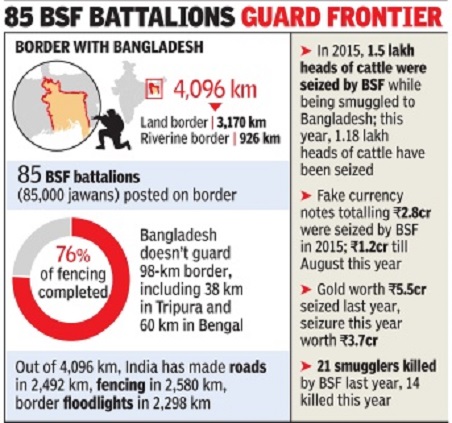Bangladesh- India relations
(→2017) |
(→Ex-PM Zia’s aide deported over ‘inappropriate’ visa) |
||
| Line 60: | Line 60: | ||
“Since I did not get the permission to come to Dhaka, I wanted to hold the press conference in India in order explain the complexities of Khaleda Zia’s case to the international media community,” Carlile, a member of House of Lords, was quoted as saying. | “Since I did not get the permission to come to Dhaka, I wanted to hold the press conference in India in order explain the complexities of Khaleda Zia’s case to the international media community,” Carlile, a member of House of Lords, was quoted as saying. | ||
| + | |||
| + | === Zia aide’s motive was suspect: MEA=== | ||
| + | [https://epaper.timesgroup.com/Olive/ODN/TimesOfIndia/shared/ShowArticle.aspx?doc=TOIDEL%2F2018%2F07%2F13&entity=Ar01506&sk=59BF8057&mode=text July 13, 2018: ''The Times of India''] | ||
| + | |||
| + | |||
| + | After being denied entry into India, Bangladesh Nationalist Party (BNP) leader Khaleda Zia’s foreign legal consultant and British MP Lord Alexander Carlile accused India of acting in a slavish manner under pressure from the government in Dhaka. | ||
| + | |||
| + | India, however, hit back saying his motive for the visit was suspect as he was trying to create differences not just between India and the Bangladesh government but also between India and BNP, the Bangladesh opposition party headed by Zia. | ||
| + | |||
| + | MEA spokesperson Raveesh Kumar said Carlile’s real purpose for the visit did not match what he had mentioned in the visa application form. Despite being told his e-visa could not be honoured because of this ‘discrepancy’, Carlile arrived on Tuesday night armed with a return ticket for a flight scheduled to leave just two hours after his arrival, the government said. | ||
| + | |||
| + | According to Indian officials, Carlile knew he would not get entry into India and that’s why he had come with a return ticket. According to a report in Dhaka Tribune, he was expected to discuss in Delhi his client Khaleda Zia’s jail sentence in the Zia Orphanage Trust corruption case. | ||
| + | |||
| + | Carlile alleged that there was “intolerable political pressure” from the Bangladeshi government to try and stop him from going to India. “The Bangladesh government called in the acting Indian high commissioner in Dhaka and asked him to urge the Indian government to refuse me entry,”' he said, addressing journalists here through Skype. | ||
| + | |||
| + | “The Indian government did that and they ought to be ashamed of themselves, denying a British QC, a member of the House of Lords, entry into India,” Carlile added, alleging that there was an attempt underway with help of judiciary in Bangladesh to keep the Zia family out of politics. | ||
| + | |||
| + | He said he was coming to Delhi for two reasons -- to attend a press briefing as a leading lawyer in the team representing Zia and to meet colleagues in a Commonwealth body that deals with human rights. “When I embarked for India at Heathrow airport yesterday, my visa was checked through the automatic system on two occasions. When I arrived in Delhi later, I was informed that my visa had been revoked,” Carlile said. | ||
| + | |||
| + | There are several cases pending against Zia, including of graft. Her party, the Bangladesh Nationalist Party, claims that the cases are politically motivated to keep its party chief out of the national elections scheduled for December. | ||
=Energy cooperation= | =Energy cooperation= | ||
Revision as of 19:15, 13 July 2018
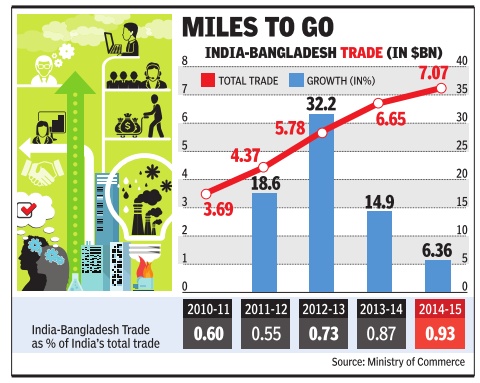
This is a collection of articles archived for the excellence of their content. |
Contents |
Bilateral issues
2017
As in April 2017
In the last five years [2012-17], trade between the two countries has grown by more than 17% with two way trade at $6.8 billion in the fiscal year 2015-16. The trade is heavily in favour of India and Bangladesh imported goods worth $5.45 billion and exported $690 million. Concerted efforts are needed to narrow the gap.
For facilitation of trade and investment Bangladesh has dedicated two SEZs in its northwest, bordering India. Trade ties are troubled by poor road and rail connectivity . The four operational `border haats' along the India-Bangladesh border have been successful, with trade worth $2,60,000 having taken place. However, there have been delays in the operationalisation of four more `border haats' in Meghalaya, agreed upon during Modi's visit.
Launch of trans-shipment operations combining riverine and land routes last year have enabled India to deliver goods through Bangladesh to Nepal and Bhutan in a third of previous time and reduced transport cost by almost half. After turning power surplus last year, India has been working with Bangladesh to double the capacity of existing transmission interconnects. There are plans to set up a third link for increasing cross-border electricity trade for widening the regional market as new generation capacities come up.
Currently, India provides Bangladesh with 2,600 MW of power. The new line is expected to wheel power from hydel projects proposed to be built in the northeast which can be shared with Bangladesh as well. India's ONGC and Bangladesh Petroleum Corporation are in negotiation to build a 6,900 km long gas pipeline linking Bangladesh, Myanmar and northeastern states. There are ongoing talks of expanding energy cooperation to BBIN (Bangladesh, Bhutan, India and Nepal) framework.
Cattle smuggling across the border has decreased, with seizure of cattle by BSF decreasing from 1.5 lakh in 2015 to 1.2 lakh in 2016 in south Bengal frontier, known as the cattle corridor of India. However, border killings of Bangladeshi civilians by BSF have not ceased, with four killed in February alone. Since 2015, a total of 77 people have been killed and 108 injured by BSF. Cattle, even if smuggled, can't be worse than drugs, and fatal shooting of offenders is not justifiable when there are options for imprisonment, fines and confiscation.
Bangladesh has extended full cooperation to India for fighting insurgent groups along the border. During 2009-14 Bangladesh arrested at least 17 top leaders of various insurgent groups, with the surrender of eight more suspects. Some of the insurgents were also sent back to India.
Bangladesh and India are set to sign a five-year MoU for bilateral defence cooperation for joint initiatives in defence technology , research and maritime infrastructure development. Also on the cards is a $500 million line of credit by India to Bangladesh for purchase of military equipment. Some have questioned whether this deal is a response to the recent purchase of two submarines by Bangladesh from China. Given that India has a defence budget of around $50 billion and shops around the world, Bangladesh with a meagre defence budget of around $2.8 billion, with reliance mostly on Chinese built military hardware, should not be a concern for India.
While defence cooperation may be one of the major outcomes of the visit, bigger issues from the Bangladeshi point of view, such as the Teesta water treaty , are still at bay . Despite Modi's pledge and assurances by mercurial Bengal CM Mamata Banerjee of a Teesta deal the water-sharing agreement is being stalled.
The writer is chairperson of Dhaka-based thinktank, Institute for Policy, Advocacy, and Governance (IPAG)
The importance of Sheikh Hasina’s visit
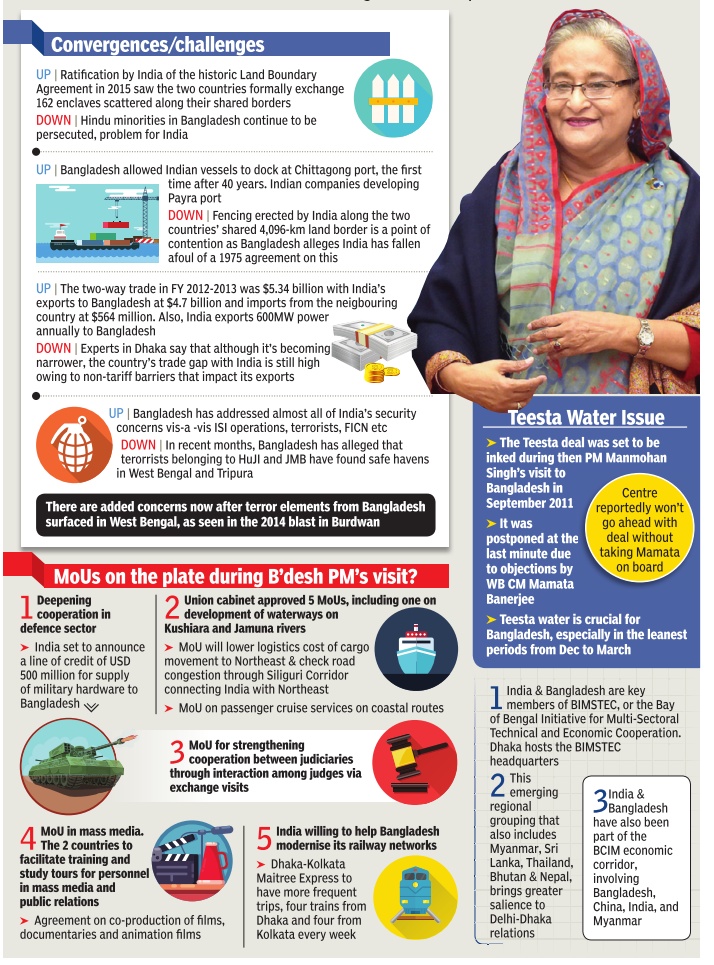
See graphic:
Convergences and challenges, MoUs signed, India and Balgadesh, as on April 7, 2017
2018
Ex-PM Zia’s aide deported over ‘inappropriate’ visa
India deports B’desh ex-PM Zia’s aide over ‘inappropriate’ visa, July 12, 2018: The Times of India
Bangladesh Nationalist Party (BNP) leader Khaleda Zia’s foreign legal consultant Lord Alexander Carlile was deported from India on Tuesday, the government has confir med.
The ministry of external affairs (MEA) said Carlile, a British national, arrived in New Delhi (from London) on July 11, 2018, without having obtained the appropriate Indian visa. “His intended activity in India was incompatible with the purpose of his visit as mentioned in his visa application. It was therefore decided to deny him entry into India upon arrival,” it added.
According to reports in Bangladesh media, he was scheduled to hold a press conference along with Zia’s legal team and members of the top brass of the BNP at the Foreign Correspondents’ Club of South Asia in Delhi.
According to a report in Dhaka Tribune, Carlile was expected to discuss his client Khaleda Zia’s jail sentence in the Zia Orphanage Trust corruption case.
The Sheikh Hasina government had apparently denied him entry into Bangladesh earlier. BNP has accused India of playing a role in the “false case” against Zia.
“Since I did not get the permission to come to Dhaka, I wanted to hold the press conference in India in order explain the complexities of Khaleda Zia’s case to the international media community,” Carlile, a member of House of Lords, was quoted as saying.
Zia aide’s motive was suspect: MEA
July 13, 2018: The Times of India
After being denied entry into India, Bangladesh Nationalist Party (BNP) leader Khaleda Zia’s foreign legal consultant and British MP Lord Alexander Carlile accused India of acting in a slavish manner under pressure from the government in Dhaka.
India, however, hit back saying his motive for the visit was suspect as he was trying to create differences not just between India and the Bangladesh government but also between India and BNP, the Bangladesh opposition party headed by Zia.
MEA spokesperson Raveesh Kumar said Carlile’s real purpose for the visit did not match what he had mentioned in the visa application form. Despite being told his e-visa could not be honoured because of this ‘discrepancy’, Carlile arrived on Tuesday night armed with a return ticket for a flight scheduled to leave just two hours after his arrival, the government said.
According to Indian officials, Carlile knew he would not get entry into India and that’s why he had come with a return ticket. According to a report in Dhaka Tribune, he was expected to discuss in Delhi his client Khaleda Zia’s jail sentence in the Zia Orphanage Trust corruption case.
Carlile alleged that there was “intolerable political pressure” from the Bangladeshi government to try and stop him from going to India. “The Bangladesh government called in the acting Indian high commissioner in Dhaka and asked him to urge the Indian government to refuse me entry,”' he said, addressing journalists here through Skype.
“The Indian government did that and they ought to be ashamed of themselves, denying a British QC, a member of the House of Lords, entry into India,” Carlile added, alleging that there was an attempt underway with help of judiciary in Bangladesh to keep the Zia family out of politics.
He said he was coming to Delhi for two reasons -- to attend a press briefing as a leading lawyer in the team representing Zia and to meet colleagues in a Commonwealth body that deals with human rights. “When I embarked for India at Heathrow airport yesterday, my visa was checked through the automatic system on two occasions. When I arrived in Delhi later, I was informed that my visa had been revoked,” Carlile said.
There are several cases pending against Zia, including of graft. Her party, the Bangladesh Nationalist Party, claims that the cases are politically motivated to keep its party chief out of the national elections scheduled for December.
Energy cooperation
2018: agreement signed on 130 km oil pipeline
B’desh, India sign 130km oil pipeline deal, April 10, 2018: The Times of India
Bangladesh and India signed an agreement on their proposed nearly 130km oil pipeline aimed at pumping Indian oil to Bangladesh with a capacity of 1 million tonnes per annum.
The deal was part of the six memorandum of understandings (MoUs) which Dhaka and New Delhi signed during a meeting between their foreign secretaries in Dhaka, Xinhua news agency reported.
Indian foreign secretary Vijay Keshav Gokhale arrived here on Sunday to hold talks with senior Bangladeshi officials on a host of bilateral and regional issues.
“Today, we add another six documents to our large and growing list of meaningful agreements signed during the recent visits of Prime Minister Narendra Modi to Bangladesh and Prime Minister Sheikh Hasina to India,” Gokhale said.
The documents included the implementation MoU on the friendship pipeline between Numaligarh in Assam and Parbatipur in Bangladesh, an MoU on cooperation between Prasar Bharati and Bangladesh Betar, an MoU for setting up an ICCR Urdu Chair in Dhaka University and an Addendum to the GCNEP-BAEC Interagency Agreement, bdnews24.com reported.
Both sides signed two more MoUs to set up language labs in 500 schools in Bangladesh and upgrade roads in Rangpur city. “This is part of our endeavour to undertake projects in Bangladesh in various socio-economic sectors including education, culture, health, community welfare, road infrastructure for which we are providing Tk 1,600 crore,” he said.
He said India remained a “committed development partner” of Bangladesh and had extended lines of credit of over $8 billion to Bangladesh in the last seven years. This is the largest amount of credit India has ever committed to any single country, he said. From 2008-09, the bilateral trade almost tripled from $2.75 billion to $7.52 billion in 2016-17. Gokhale called Bangladesh “India’s biggest trade partner in south Asia”.
Talking about the energy and power sector, Gokhale said India was currently supplying 660 MW of power to Bangladesh and they were on course to add at least 500 MW more by June.
Gokhale also announced the second phase of humanitarian assistance for the Rohingya refugee camps in Bangladesh. His Bangladeshi counterpart Shahdiul Haque said they were “happy” over India’s position on the Rohingya refugee issue and its progress on the pending Teesta water sharing deal. Haque said the two discussed all aspects of the relations between the two nations, including the pending Teesta water sharing issue, and was “delighted” regarding the outcome.
Gokhale is expected to meet PM Sheikh Hasina and foreign minister AH Mahmood Ali on Tuesday before retur ning home.
Military cooperation
November 2016: Sampriti-7 joint exercise
The Hindustan Times, November 2, 2016
India and Bangladesh undertook a joint military exercise in Bangladesh from November 5, the Defence Ministry announced.
The exercise is likely to include counter-insurgency and counter-terrorism operations, it added.
Joint exercise of 2016 is an important bilateral defence cooperation endeavour between India and Bangladesh and will be the sixth edition of the same, hosted alternately by the two countries.
In 2015, India hosted ‘Sampriti 2015’ at Binnaguri, West Bengal. The first exercise in this series was conducted in 2010 at Jorhat in Assam.
2018/ Coordinated Patrol (CORPAT)
India, Bangladesh Navies to join hands, June 24, 2018: The Hindu
India and Bangladesh have agreed to institute a Coordinated Patrol (CORPAT) as an annual feature between the two Navies. The first edition will be inaugurated by Navy Chief Admiral Sunil Lanba during his visit there from June 24 to 29.
“The commencement of CORPAT is major step towards enhanced operational interaction between both Navies. Naval cooperation between India and Bangladesh has been traditionally strong, encompassing a wide span which includes operational interactions through port calls, passage exercises along with capacity building, capability enhancement and training initiatives,” the Navy said in a statement.
The Navy said the aim of Adm. Lanba’s visit is to “consolidate bilateral defence relations between India and Bangladesh and to explore new avenues for naval cooperation.”
During his visit, Adm. Lanba will call on Bangladesh President Md Abdul Hamid and Prime Minister Sheikh Hasina and also interact with the three service Chiefs of Bangladesh armed forces.
Widening cooperation
Over the last few years, the Navy has expanded its assistance to countries in the region through “material support, training, EEZ (Exclusive Economic Zone) surveillance, provisioning of platforms, hydrographic assistance, joint exercises and offering slots in professional training courses.”
The Indian Navy regularly conducts CORPATs with Indonesia, Myanmar and Thailand. It also conducts EEZ surveillance of Maldives, Mauritius and Seychelles on their request.
Trade relations
India-Bangladesh trade
The Times of India, Feb 25, 2012
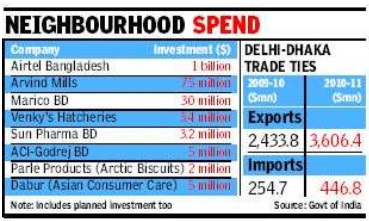
Sidhartha & Surojit Gupta
With over 100 Indian firms already in Bangladesh, and trade in current financial year already at $1.7bn, business relations between the two countries have never looked better
Kotak Mahindra Bank is the latest Indian firm to line up to be part of the growing India-Bangladesh trade and investment story. The private sector lender has sought permission from the authorities across the border to set up a joint venture with Abdul Mehtab Ahmed, a local businessman. A Kotak Mahindra spokesperson told ToI that the move is in line with the bank’s growth strategy. But any banking analyst would tell you that banks typically follow companies to meet their funding requirements. What they leverage is their existing ties. With over 100 Indian companies already in Bangladesh, it is not surprising that the country is on the banking radar.
From Bharti Airtel, which has invested close to $1 billion, to the AV Birla Group, Arvind Mills and Sun Pharma and even smaller players who make fans, plastic products and garments, several Indian players are sensing an opportunity across the border. After all, trade ties have improved, which is evident in better trade numbers. In the first six months of the current financial year trade has increased to around $1.7 billion from $1.56 billion in April-September 2011. Although exports from India have increased marginally to $1.4 billion, imports have gone up 85% to $290 million from around $160 million a year ago. The target is to increase trade to $1 billion this year. “The terms of trade are still tilted in India’s favour but we expect this to improve significantly in the coming years,” says an official. Within this it is textiles and raw jute imports that have seen a steep rise. Raw jute imports from Bangladesh rose over 500% to $54 million, while readymade garment imports rose nearly three-fold from $8 million in the first half of 2010-11 to $22 million during April-September 2011. Import of made-ups of textiles also increased to $27 million. India had offered tariff concessions as well as dutyfree import quotas to Bangladesh to boost trade ties. Numbers indicate that cotton fabric and yarn exports from India rose around 22% to $350 million, indicating that ties with garment makers across the border were improving. The concessions given on export of textiles are beginning to have an impact and there is already a clamour for protection from Bangladesh, which is now among the largest textiles exporters. Indian officials, however, dismissed suggestions that import of textiles from Bangladesh were affecting the local industry, saying the local market was worth nearly $35 billion (Rs 1.82 lakh crore). But officials from both sides recognize that there are several bottlenecks, starting with the pile-up of trucks at the border.
Anyone who has visited the Petrapole or the Akhaura border with Bangladesh would tell you that a long queue of trucks on either side of the border is a common sight. “India has worked on improving the border but we need to upgrade the customs facility. There are very few officers to clear the consignments,” says a Bangladesh government official. There are other irritants too such as the absence of money changers at the border. “On both sides, infrastructure is a big issue,” adds another official. While work at Petrapole is underway for an integrated check post, they say often the attitude of the customs officials at the border posts impacts trade. “There are not enough senior officers and often one can find that the officers who are there are not well versed in the latest notifications. This delays trade enormously,” said one official. Adding to the problem is the lack of quarantine officers to take care of farm exports and imports. But some progress is visible as ties between the two countries improve. New posts are scheduled to come up Agartala, Dawki, Hili, Chandrabangha, Sutarkhandi and Kawarpuchiah. Simultaneously, eight land customs stations are also coming up with the two projects together expected to cost over Rs 600 crore. There are border haats too which permit weekly trade in select local goods. This is a move aimed at building confidence on both sides of the border and increasing peopleto-people contact.
While the bonhomie is visible, there are several decisions that can help bolster ties. For instance, Bangladesh is sitting on proposals to permit Indian companies to get goods and raw material delivered at the Chittagong and Mongla ports and then transport then through the North East. That’s linked to the deal on Teesta. Politics apart, there are trade irritants too, which Bangladesh terms as non-tariff barriers. For instance, both countries have productwise restrictions on entry of consignments at various entry points. Bangladesh is also willing to open up more to Indian companies. They have said they are willing to offer one or two special economic zones to Indian companies. So far there has been no takers but expectations are that the plan will soon take off. Bangladesh officials say the potential for raising bilateral trade is immense. Both sides have recognized the potential and it is upto the policymakers to seize the initiative to nurture the relationship which analysts say can accelerate the pace of regional integration in South Asia and transform the lives of people living along the India-Bangladesh border.
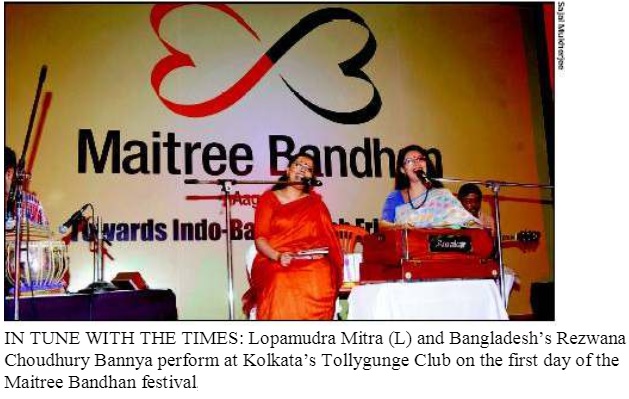
Coastal Shipping
First cargo ship from India arrives in B'desh
The first container ship from India has arrived at Panagon river port in Dhaka under the Coastal Shipping Agreement signed in 2015, allowing direct cargo vessel movement between the two countries.
The ship, Shonartori Nou Kalyan-1, reached the Panagon port on Friday with 65 containers on board. PTI
